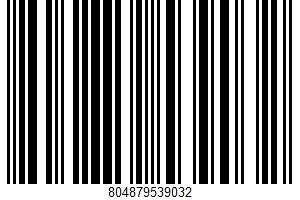Energy Snack - 165 calories
Manufacturer Mozian & Associates, Inc.
Product Information and Ingredients
Energy Snack is manufactured by Mozian & Associates, Inc. with a suggested serving size of 3.5 ONZ (42 g) and 165 calories per serving. The nutritional value of a suggested serving of energy snack includes 0 mg of cholesterol, 0 mg of sodium, 19.5 grams of carbohydrates, 3 grams of dietary fiber, 12 grams of sugar and 6 grams of proteins.
The product's manufacturer code is UPC: 804879539032.
Calories from fat: a total of 32.73% of the calories in the suggested servig of this product come from fat.
Ingredient List
- Peanut Butter
- Brown Rice Syrup
- Rolled Oats
- Raw Brown Rice Protein
- Raw Honey
- Dates
- Organic Puffed Amaranth
- Chocolate Chips (evaporated Cane Juice
- Chocolate Liquor (no-alcoholic)
- Non-dairy Cocoa Butter )
- Expeller Pressed Organic Coconut Oil
- Chia Seeds
- Maca
- Natural Vanilla Extract
- Erythritol
- Stevia Rebiana
- Monk Fruit (natural Sweetener)
- Natural Sunflower Lecithin ( An Emuisifier)
- Sea Salt

Nutrition Facts
Serving Size 3.5 ONZ (42 g)
| Amount Per Serving | ||
|---|---|---|
| Calories 165 | Calories from Fat 54 | |
| % Daily Value* | ||
| Total Fat 6g | 4% | |
| Saturated Fat 3g | 6% | |
| Trans Fat 0g | ||
| Cholesterol 0mg | 0% | |
| Sodium 0mg | 0% | |
| Total Carbohydrate 19.5g | 3% | |
| Dietary Fiber 3g | 5% | |
| Sugars 12g | ||
| Protein 6g | ||
| Vitamin A 0% | Vitamin C 4% |
| Calcium 1% | Iron 4% |
* Percent Daily Values are based on a 2,000 calorie diet.
Nutrition Facts
Serving Size 100g (about 3.52 oz)
| Amount Per Serving | ||
|---|---|---|
| Calories 393 | Calories from Fat 129 | |
| % Daily Value* | ||
| Total Fat 14.3g | 9% | |
| Saturated Fat 7.1g | 15% | |
| Trans Fat 0g | ||
| Cholesterol 0mg | 0% | |
| Sodium 143mg | 3% | |
| Total Carbohydrate 46.4g | 7% | |
| Dietary Fiber 7.1g | 12% | |
| Sugars 29g | ||
| Protein 14g | ||
| Vitamin A 0% | Vitamin C 10% |
| Calcium 2% | Iron 9% |
* Percent Daily Values are based on a 2,000 calorie diet.
Energy Snack Nutritional Value
| Nutrient | Suggested Serving 3.5 ONZ (42 g) | Standard Serving 100g |
|---|---|---|
| Energy | 165 kcal (3%) | 393 kcal (8%) |
| Protein | 6 g (5%) | 14.29 g (12%) |
| Total Lipid (fat) | 6 g (4%) | 14.29 g (9%) |
| Carbohydrate, By Difference | 19.5 g (3%) | 46.43 g (7%) |
| Fiber, Total Dietary | 3 g (5%) | 7.1 g (12%) |
| Sugars, Total | 12 g (20%) | 28.57 g (48%) |
| Calcium, Ca | 30 mg (1%) | 71 mg (2%) |
| Iron, Fe | 1.62 mg (4%) | 3.86 mg (9%) |
| Sodium, Na | 60 mg (1%) | 143 mg (3%) |
| Vitamin C, Total Ascorbic Acid | 6 mg (4%) | 14.3 mg (10%) |
| Vitamin A, Iu | 0 IU (0%) | 0 IU (0%) |
| Fatty Acids, Total Saturated | 3 g (6%) | 7.14 g (15%) |
| Fatty Acids, Total Trans | 0 g (0%) | 0 g (0%) |
| Cholesterol | 0 mg (0%) | 0 mg (0%) |
Calories Burn off Time
How long would it take to burn off Mozian & Associates, Inc. Energy Snack with 165 calories? A brisk walk for 36 minutes, jogging for 17 minutes, or hiking for 28 minutes will help your burn off the calories in energy snack.
Burn off time varies based on your weight, physical activity and exercise intensity. The following physical activity table contains an estimated burn off time for a person weighting 154 lbs.
| Physical Activity | Burn Off Time |
|---|---|
| Bicycling - 10 mph or less | 34 minutes |
| Dancing | 30 minutes |
| Golfing | 30 minutes |
| Hiking | 28 minutes |
| Light Gardening | 30 minutes |
| Stretching | 55 minutes |
| Walking - 3.5 mph | 36 minutes |
| Weight Training - light workout | 46 minutes |
| Aerobics | 21 minutes |
| Basketball | 23 minutes |
| Bicycling - 10 mph or more | 17 minutes |
| Running - 5 mph | 17 minutes |
| Swimming | 19 minutes |
| Walking - 4.5 mph | 22 minutes |
| Weight Training - vigorous workout | 23 minutes |
Footnotes
Percent daily values are based on a 2,000 calorie reference diet. Factors like age, gender and level of physical activity may affect your daily required values.
The editorial opinions regarding food value or quality in this website are given without warranty, and are not intended to replace medical advice or a nutritionist guidance.
Dietary Recommendations
A healthy eating pattern that accounts for all foods and beverages within an appropriate calorie level could help achieve and maintain a healthy weight and reduce the risk of chronic disease. Healthy eating habits include the following:
- Vegetables from all subgroups, including dark, green, red and orange vegetables and also beans and peas
- A variety of whole fruits
- Grains with at least half of which are whole grains
- Low or fat free dairy products, including milk, yogurt, cheese and/or fortified soy beverages
- Protein foods, including seafood, lean meats and poultry, eggs and nuts
- Oils with limited amounts of saturated fats and trans fats, added sugars, and sodium
